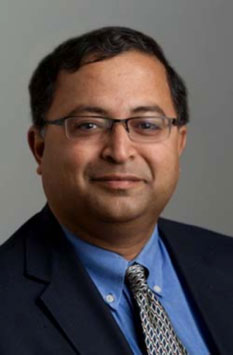About
Venkat N. Krovi (FASME, SM IEEE) is currently the Michelin Endowed SmartState Chair Professor of Vehicle Automation at Clemson University – International Center for Automotive Research. His research focuses on intelligent modulation of distributed physical-power-interactions (motions/forces) between humans and autonomous-systems to unlock the “power of the many”. Research activities focus on the life-cycle treatment (design, modeling, analysis, control, implementation and verification) of a new generation of systems for realizing Human-Autonomy synergy with applications in vehicle-automation, plant-automation, defense and healthcare-delivery arenas.
In this process, he has had opportunity to collaborate with various anatomists, physiologists, pathologists, biomechanicians and surgeons in addition to computational scientists and engineers. His work has been funded by NSF, NIH, DARPA, ARO as well as numerous state and industrial grants. His work has been published in more than 175 journal/conference articles, book chapters and patents. He has received multiple awards, including the National Science Foundation CAREER Award, Petro-Canada Young Innovator Award, and several best poster, conference and journal paper awards.
He currently serves as the Editor-in-Chief of the ASME Journal of Mechanisms and Robotics and was the Founding EiC of the SAE Journal of Connected and Automated Vehicles. He has also taken significant leadership roles within multiple professional societies (ASME, IEEE) and currently serves on the Executive Committee of the IEEE Robotics and Automation Society. Further details are available from http://cecas.clemson.edu/armlab-cuicar
Visit Dr. Krovi's Faculty Profile or the CUICAR Automation, Robotics and Mechatronics Laboratory (ARMLAB).
How their research is transforming health care
Krovi’s interests lie in the design and development of the mechanical and mechatronic systems for extended physical/kinesthetic interaction between humans and virtual/physical environments. Such systems can range in complexity from simple unidirectional/input-only interfaces such as arrays of switches to bi-directional/haptic interfaces capable of engaging multiple human sensorimotor channels simultaneously. Their principal promise lies in the ability to expand, assist and train human sensorimotor capabilities – by improving physical strength (human extenders), augmenting the manual precision (surgical simulators) and improving the dexterity (rehabilitation aids, robots). The critical requirements on the effective interface and communication of human-user intent to the virtual environment and the display of the results back to the human user can be judged using performance benchmarks such as the fidelity, transparency, stability, accuracy, and real-time interactivity.
Representative past research has included studies of: (i) Individualized Interactive Rehabilitation of Upper-Limb Dysfunction within a Haptic Virtual Driving Environment (hVDE); (ii) Real-Time Haptic Immersive Virtual-Cadaveric Dissection Simulator; (iii) Quantitative Visual Sensing of Dynamic Behaviors for Home-based Progressive Rehabilitation; and (iv) Quantitative and Objective System for Technical Assessment and Training of Skills (STATS) for Surgical Performance.
News and Media related to Dr. Krovi’s work
- For Clemson's Center for Workforce Development, VR is a Helpful Tool in Training Students to Work with Robots - Greenville Business Magazine
- SC's SmartState Program Gives University Researchers the Funds They Need to Innovate - Greenville Business Magazine
Health Research Expertise Keywords
Faculty Scholar, Medical robotics, haptics, exoskeletons, rehabilitation engineering, quantitative ergonomics, performance assessment

